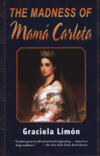The Madness of Mamá Carlota
Her story reads like fiction. In 1864 Napoleon III and sentimental Mexican royalists re-established a Mexican monarchy, placing the Austrian Prince Maximilian and his Belgian wife Carlota as rulers. The move, in hindsight as grotesque as the gaudy art and fashion of Napoleon’s era, was extremely unpopular in the Americas. Following the Civil War, the American government supported an uprising spearheaded by lawyer/reformer Benito Juarez. The puppet monarchy was overthrown in 1867, and Maximilian was executed. Carlota escaped, never recovered from a subsequent nervous breakdown, and lived in a castle serving as an asylum until the age of 87.
Her story reads like fiction. In 1864 Napoleon III and sentimental Mexican royalists re-established a Mexican monarchy, placing the Austrian Prince Maximilian and his Belgian wife Carlota as rulers. The move, in hindsight as grotesque as the gaudy art and fashion of Napoleon’s era, was extremely unpopular in the Americas. Following the Civil War, the American government supported an uprising spearheaded by lawyer/reformer Benito Juarez. The puppet monarchy was overthrown in 1867, and Maximilian was executed. Carlota escaped, never recovered from a subsequent nervous breakdown, and lived in a castle serving as an asylum until the age of 87.
With the possible exception of Juarez, a sentimental 1939 costume epic that proved Paul Muni (in the title role) could give a great performance in anything and Bette Davis (as Carlota) was more believable being mad than going mad, the possibilities of this emotionally charged story haven’t really been explored. Now Graciela Limón has provided this sad history with a backstory of cultural understanding—and genuine devotion—in her page-turning The Madness of Mamá Carlota.
Limón’s Carlota becomes a complete character thanks to two convincing fictional devices. The first are journal entries and interior monologues dealing with everything from a (rumored though historically unproven) lover to the impending disaster of “why those men had invested so much effort and capital in the empire only to withdraw it without explanation.” Hence, this Madness is refreshingly questionable; Carlota is an intelligent woman who is treated as insane because she speaks her mind. It is not known if this was true, but Limón—and ultimately her readers—can name many nineteenth century women who were treated as such.
The other device is the inclusion of three sisters who, thanks to magic realism, talent, beautiful singing voices, and most of all being in the right place at the right time, become Carlota’s most trusted ladies-in-waiting. The devotion of Chelo, Tila, and Lula Chontal isn’t just misplaced colonialism. It is through this strong-willed trio that Carlota discovers Mexico.
Another discovery Carlota makes is that of respect. Following a near-death experience, the Empress gives the sisters advice in diplomacy by warning them that poison is not merely physical, as it was in the Mexican court, but “found everywhere, especially in the hearts of evil people.”
It is within the Empress’s enthusiasm for her adopted homeland and the plight of the orphaned Chontal sisters that Limón very effectively introduces the undercurrents that would doom this particular misplaced dream of Empire:
What the mestizos (people of mixed heritage), as well as the prelates chose to ignore, and what Maximilian and Carlota were incapable of realizing, was that the throngs surrounding them were men and women who had not forgotten the Battle of Puebla nor that their country had been invaded. Among them were survivors of the Puebla battle and other conflicts, people who grieved that heroic actions had come to nothing because los franceses had returned. They, los indios, were once more the ones on the bottom.
Another, better historical aside is her summarization of Carlota’s brother, King Leopold of Belgium, who steals her inheritance and is best remembered for “his inhumane and brutal colonization in the African Congo.”
The Madness of Mamá Carlota is a historical novel that is convincing both as a recreation of an odd, unfortunate event and as an elaboration on the possibilities within the unknown and unwritten of those facts.





